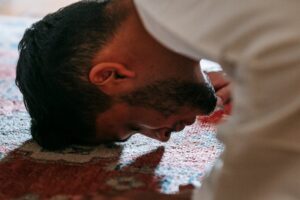The prophet Mohammad (SAAW) was sent at a time when there hadn’t been any prophets for a long period of time, different from what humanity was accustomed to during the time of Bani’ Israel as one prophet was followed immediately by another. There were even times when multiple prophets and messengers were present during the same period. Yet prophet Mohammad (SAAW) and prophet Issa (AS) were around 600 years apart. This gap left humanity in a period of (Jahiliya) ignorance that spread, not just in the Arabian Peninsula but around the globe.
By the time prophet Mohammad (SAAW) was sent, he was faced with lots of challenges. Building character was more than merely reviving moral and ethical values, but rather to present humanity with a model generation that would influence the generations to come.
With Allah’s help, we can say it was a miracle that the prophet (SAAW) was able to do that in a period of only 23 years. The Makkah period of 13 years established the foundation of everything that came later in the Madinah period and beyond. He was able to establish a foundation of faithful believers who, when presented with details of religion, responded with full practice in all of Sharia’s aspects.
The problem we face now in Da’wah to our community and in raising our kids as the next generation of Muslims is that we place the focus on the rituals and rulings of Halal and Haram BEFORE we establish true understanding and solid faith in Islam.
Two of the main challenges that the prophet (SAAW) faced are the same in almost every generation. The idea of blindly keeping the traditions of one’s ancestors and the rise of tyranny prompted the prophet (SAAW) to separate between the truth and highly regarded inherited acts on one side and calling for mercy and forgiveness on another side.
These days, we need to reintroduce the same concept to separate blindly mixed cultural (religiously packaged) practices from the truth of Islam alone especially since we are living in a different place and culture. For example, the cultural practice within many Muslim communities that does not hold males in the same degree of liability as females for the same wrongful acts, is causing a lot of young women to step away from Islam. This skewed double standard in the name of religion gives the impression that the religion is unjust which couldn’t be further from the truth! If a male engages in an act of zina, it is easily forgiven and forgotten, but if a female does it, the shame is carried for decades on her and her family! If a male gets mixed up with drugs, it is the vulnerability of youth that we need to help, but if a female does it, it is the shame that needs to be judged! Wrong is wrong on all, there is no favor of males over females regarding liability towards wrongful acts.
The theme of forgiveness is a core factor in dealing with all shortcomings of people regardless how big the sins are. For example, a man who kept drinking liquor repeatedly was brought for punishment, and one of the Sahabah cursed him. The prophet (SAAW) said: “Do not curse him, for by Allah he loves God and His messenger.” Another example was when a man came to tell the prophet (SAAW) that he had done an act punishable in Islam and that the prophet (SAAW) should carry out that punishment. (Scholars refer to some act of Zina) The prophet (SAAW) asked him: “Did you pray Isha with us tonight?” The man replied that he had, and the prophet (SAAW) said: “Indeed Allah has forgiven you.” Unfortunately, many communities have lost this sense of Rahmah that the prophet, our role model (SAAW) showed, and are so eager to rush into judgment and expose the sins of others, even arrogantly sentencing them to Hell! Would they themselves fear the judgment of Allah if their mistreatment was the reason for preventing someone from coming back to Allah?!
Da’wah must be based on the general guideline Allah (SW) has set for us:
{Invite to the way of your Lord with wisdom and good instruction and argue with them in a way that is best. Indeed, your Lord is most knowing of who has strayed from His way, and He is most knowing of who is [rightly] guided.} 16:125.
May Allah rightly guide us, forgive us, and help us invite others to the Mercy of Allah through our example, fashioned after our role model who was sent as a mercy to mankind, Mohammad (SAAW). Ameen
By Sh Kifah Mustapha




